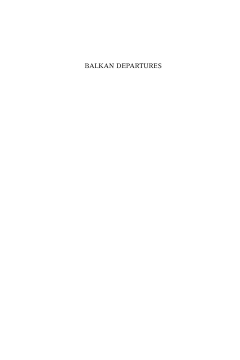
Additional Information
Book Details
Abstract
In writings about travel, the Balkans appear most often as a place travelled to. Western accounts of the Balkans revel in the different and the exotic, the violent and the primitive − traits that serve (according to many commentators) as a foil to self-congratulatory definitions of the West as modern, progressive and rational. However, the Balkans have also long been travelled from. The region’s writers have given accounts of their travels in the West and elsewhere, saying something in the process about themselves and their place in the world. The analyses presented here, ranging from those of 16th-century Greek humanists to 19th-century Romanian reformers to 20th-century writers, socialists and ‘men-of-the-world’, suggest that travellers from the region have also created their own identities through their encounters with Europe. Consequently, this book challenges assumptions of Western discursive hegemony, while at the same time exploring Balkan ‘Occidentalisms’.
Alex Drace-Francis is Lecturer in Modern European History at the University of Liverpool. He is the author of The Making of Modern Romanian Culture (2006) and of many articles on Romanian and Balkan history, historiography and literature.
“…all the individual contributions are analytically sophisticated as well as readable…What stands out is how this collection as a whole enables us to rethink the significance of West-East connections from the perspective of travel writers from the Balkans who, while reflective of the West, often intended their travelogues to be also mirrors of what was either good or bad at home. Another important contribution is the rethinking and critique of binaries in the East-West dialogue.” · Slavonic & East European Review
“This relatively slim but infinitely rich and engaging volume discussing travel writing in Greek, Romanian, Bulgarian, Serbian and Croatian literatures and cultures promises to change the state of scholarship on the region, as well as the genre of travel writing, more generally…It is bound to lead scholars of the region and travel writing in general, as well as those concerned with nuancing theoretical models of Otherness, in new productive directions.” · Anthropological Notebooks
“The essays [in this volume] with their diverse perspectives on European and Balkan identity, as well as on the class, gender, political and literary identity of the travel writers themselves [...] contribute to the enrichment and further opening up of this interdisciplinary field, encompassing travel literature, literary and cultural contacts, in the equally heterogeneous and often arbitrarily-defined Balkan region." · Croatian Journal of Ethnology and Folklore
“The collection fills an obvious gap in the literature on travel writing, and Bracewell's introductory essay, subtitled ‘Points of Departure,’ provides an excellent overview of the subject.” · Choice
"...offers a set of unique perspectives on how travel writers have imagined, experienced and represented other people and other places. It shifts attention to the voices and agency of travellers from the Balkans and the ways in which they have experienced and described the sometimes strange and exotic West... Most fascinating the multi-faceted trajectories of expectations, perceptions and imageries which reverse the standard hegemonic gaze from West to East." · Stephanie Schwandner-Sievers, School of Slavonic and East European Studies, University College London
Wendy Bracewell is Senior Lecturer in History and Deputy Director at the School of Slavonic and East European Studies at University College London, and Director of the AHRC research project ‘East Looks West’ on East European travel writing in Europe. She has published extensively on the Balkans and on travel writing.
